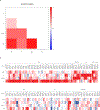Distinct germline genetic susceptibility profiles identified for common non-Hodgkin lymphoma subtypes
- PMID: 36273105
- PMCID: PMC10337695
- DOI: 10.1038/s41375-022-01711-0
Distinct germline genetic susceptibility profiles identified for common non-Hodgkin lymphoma subtypes
Erratum in
-
Correction: Distinct germline genetic susceptibility profiles identified for common non-Hodgkin lymphoma subtypes.Leukemia. 2023 Oct;37(10):2142. doi: 10.1038/s41375-023-01978-x. Leukemia. 2023. PMID: 37666943 No abstract available.
Abstract
Lymphoma risk is elevated for relatives with common non-Hodgkin lymphoma (NHL) subtypes, suggesting shared genetic susceptibility across subtypes. To evaluate the extent of mutual heritability among NHL subtypes and discover novel loci shared among subtypes, we analyzed data from eight genome-wide association studies within the InterLymph Consortium, including 10,629 cases and 9505 controls. We utilized Association analysis based on SubSETs (ASSET) to discover loci for subsets of NHL subtypes and evaluated shared heritability across the genome using Genome-wide Complex Trait Analysis (GCTA) and polygenic risk scores. We discovered 17 genome-wide significant loci (P < 5 × 10-8) for subsets of NHL subtypes, including a novel locus at 10q23.33 (HHEX) (P = 3.27 × 10-9). Most subset associations were driven primarily by only one subtype. Genome-wide genetic correlations between pairs of subtypes varied broadly from 0.20 to 0.86, suggesting substantial heterogeneity in the extent of shared heritability among subtypes. Polygenic risk score analyses of established loci for different lymphoid malignancies identified strong associations with some NHL subtypes (P < 5 × 10-8), but weak or null associations with others. Although our analyses suggest partially shared heritability and biological pathways, they reveal substantial heterogeneity among NHL subtypes with each having its own distinct germline genetic architecture.
© 2022. This is a U.S. Government work and not under copyright protection in the US; foreign copyright protection may apply.
Conflict of interest statement
Competing Interests:
Tait Shanafelt received research support to his institution from Genetech, Pharacyclics, AbbVie, Cephalon, Hospira, GlaxoSmithKline, Polyphenon E International, Merck, and Celgene and holds a patent (US14/292,075) on green tea extract epigallocatechin gallate in combination with chemotherapy for chronic lymphocytic leukemia. Karin Smedby received research funding from Janssen Pharmaceuticals AB for research unrelated to this project. Corinne Haioun received honoraria from Novartis, Amgen, Servier/Pfizer, and Gilead Sciences, acted as a consultant or advisor to Roche, Celgene, Janssen-Cilag, Gilead Sciences, Takeda, Miltenyi Biotec, Abbvie, and ADC Therapeutics, and received travel, accommodations and/or expenses from Roche, Celgene, and Amgen. Kenan Onel is currently a full-time employee at Sema4. The other authors declare no competing interests.
Figures


References
-
- Bray F, Ferlay J, Soerjomataram I, Siegel RL, Torre LA, Jemal A. Global cancer statistics 2018: GLOBOCAN estimates of incidence and mortality worldwide for 36 cancers in 185 countries. CA Cancer J Clin. 2018;68(6):394–424. - PubMed
-
- Wang SS, Slager SL, Brennan P, Holly EA, De Sanjose S, Bernstein L, et al. Family history of hematopoietic malignancies and risk of non-Hodgkin lymphoma (NHL): a pooled analysis of 10 211 cases and 11 905 controls from the International Lymphoma Epidemiology Consortium (InterLymph). Blood. 2007;109(8):3479–88. - PMC - PubMed
Publication types
MeSH terms
Grants and funding
- P01 CA087969/CA/NCI NIH HHS/United States
- R01 CA148690/CA/NCI NIH HHS/United States
- P30 CA008748/CA/NCI NIH HHS/United States
- K08 CA134919/CA/NCI NIH HHS/United States
- P30 CA015083/CA/NCI NIH HHS/United States
- ZIA CP010136/ImNIH/Intramural NIH HHS/United States
- P50 CA097274/CA/NCI NIH HHS/United States
- R01 CA049449/CA/NCI NIH HHS/United States
- R01 CA134674/CA/NCI NIH HHS/United States
- U01 CA118444/CA/NCI NIH HHS/United States
- P30 CA016087/CA/NCI NIH HHS/United States
- MC_UU_12014/3/MRC_/Medical Research Council/United Kingdom
- R01 CA098122/CA/NCI NIH HHS/United States
- U01 CA049449/CA/NCI NIH HHS/United States
- R01 CA149445/CA/NCI NIH HHS/United States
- 001/WHO_/World Health Organization/International
- MR/S019669/1/MRC_/Medical Research Council/United Kingdom

